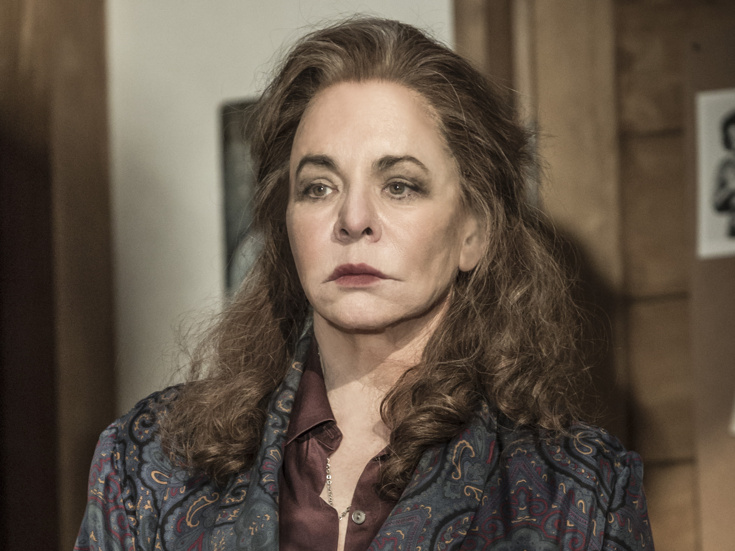Apologia Star Stockard Channing on Returning to the London Stage, 'Creepy' Grease Fixations & Not Writing a Memoir

(Photo: Marc Brenner)
Stockard Channing needs no introduction as a Broadway legend, but London’s good fortune is to have welcomed the Tony and Emmy-winning actress at regular intervals. She first appeared on the U.K. stage in Six Degrees of Separation, only to return in a 2007 Almeida revival of Awake and Sing and now, at the Trafalgar Studios, in Apologia—the Alexi Kaye Campbell play that was previously seen in 2009 at the Bush Theatre, albeit with a different cast. How does Channing feel as an American abroad playing an American abroad? The supremely engaging actress sat with Broadway.com early one recent evening to discuss that topic and a whole lot more.
What was the appeal of crossing the Atlantic to do your third London play?
This play genuinely has been a gift because it has taught me a lot and restarted muscles that I hadn’t been using for a while. At first, I was just taken with the piece and how it is written only to discover with time how resonant is it politically, both with a capital and a small P. It’s a big little play.
How much did you know about the people involved when you first got the offer?
To be honest, almost nothing, which seems funny now because Alexi [playwright] and I have become friends; we spend a lot of time together, and Jamie [Lloyd, the director], too. I’m thrilled to be here, and I’m not just saying that. This honestly has been and, as we speak, continues to be a really great experience.
What are your thoughts on Kristin, the U.K.-based American art historian and onetime radical whom we find locked in a familial showdown with her two sons as the play progresses?
I find it so poignant because I think we go through life, especially as we get older, thinking with regard to relationships that we get it and we know their limitations and we know their definitions, whereas the thing with Kristin is that she has done absolutely nothing wrong and she can’t win. What she finds is that you can’t define yourself against other people’s opinions, which is so heartbreaking.
Do you find some of Kristin’s activism and sense of adventure in yourself?
Sure! Like Kristin, I packed a bag in my day—the sort you carry around and take with you on the ferry when you’re sleeping on the deck going from Brindisi to Patmos. But I can’t take credit for being as politically active as Kristin. I had my sympathies, especially up in Cambridge [Massachusetts, where Channing went to college], but my career, of course, has been as an actress, which wasn’t Kristin’s thing at all.
Were you surprised to discover that Alexi Kaye Campbell originally wrote your character as a Brit, and that she was played as one by Paola Dionisotti in 2009?
Yes, especially since I never read that version of the script so don’t know how much the language may have changed. Having Kristin be American makes it better, I think, because she’s so isolated: it ties in so well with her personality and what she did at that time, which was to pack a bag and get on a plane. I don’t know if people do that anymore.
Were you wanting specifically to return to the London stage?
I was, really. London and the London theater have been a rhythm in my life, and my late husband also had friends here, so we came here a lot. It’s always been a place I feel very comfortable with. So, I just thought it was right to take this hunk of time to do this play, and then, of course, you do something and it grows into something else, which thank God has been very positive.
What was it like to arrive here over the summer to find two of your castmates from Broadway’s smash 2014 production of It’s Only a Play—Nathan Lane and F. Murray Abraham—in shows of their own [Angels in America and The Mentor, respectively]?
It was great to see them. What you realize is it’s an international enterprise, the theater, though I still think it’s more unusual for Americans to come here than it is the other way. [The Terrence McNally revival] was a funny, wonderful thing to do and I really loved it, but this particular experience has been extraordinary for me. It’s kind of back to what I set out to do a million years ago.
Isn’t it often said that nothing is harder than comedy?
Yeah, I think the line is “dying is easy, comedy is hard.” People say to me after this, “Oh, you must be exhausted,” but I actually find doing this to be invigorating. That often happens on a drama where you emerge gutted but also chastened whereas with a comedy you’re spent.
Were you able to see last season’s Broadway revival of Six Degrees of Separation, given your profound connection to that particular title on both stage and screen [Channing got Tony and Oscar nods for playing John Guare’s leading role of Ouisa]?
I’m a Tony voter, so I went. What was extraordinary was that I had never seen the play before. I sat there thinking, "My God, what a great play this is!" I was stunned by its overall impact.
Do you have a bucket list at this point of roles you would like to play?
Oh, please [laughs]! You mean, to do a part that you’ve always wanted to do in the wrong company at the wrong time? That would be hell. As with everything in this business, it’s all about where, when, what and with whom, so, no, I don’t at all.
Is it ever odd for you the way British interviewers seem to focus incessantly on your role as Rizzo all those years ago onscreen in Grease?
I have to admit it’s a teensy bit creepy. With our play, you can’t sign things at the stage door not connected with the show, but you still get mail enclosing photos of you from 45 years ago. I don’t want to see these pictures anymore, would you?
Does theater still have pride of place for you, your TV and film success notwithstanding?
It’s still the core of what I do. More than ever, it’s the art form I find the most fascinating and also the one you can most control. It’s the only one where you’re not edited or eliminated because let’s face it, that’s what editing is. If you want access to performing a piece the way you really want to perform it, the only way to fully do that is on the stage.
So, would you like to do Apologia in New York?
There’s been talk about that, but I have no idea if it’s going to happen; that sort of stuff is very complex to do. But I think it would be great if it went over because I think the play reminds people that Kristin’s state of mind actually exists and is viable and should maybe be reevaluated.
Has this play made you ponder writing a book, given that the plot engine of Apologia has to do with fallout from a memoir Kristin has written?
I’ve been asked and absolutely not! I’m not going to air my dirty laundry. It would only be misunderstood, which is one of the lessons in this play.

